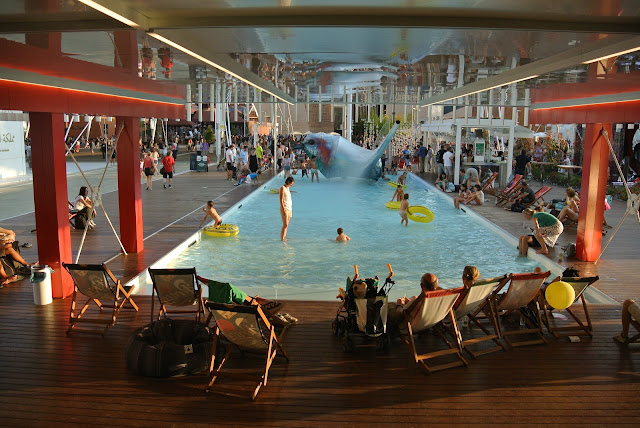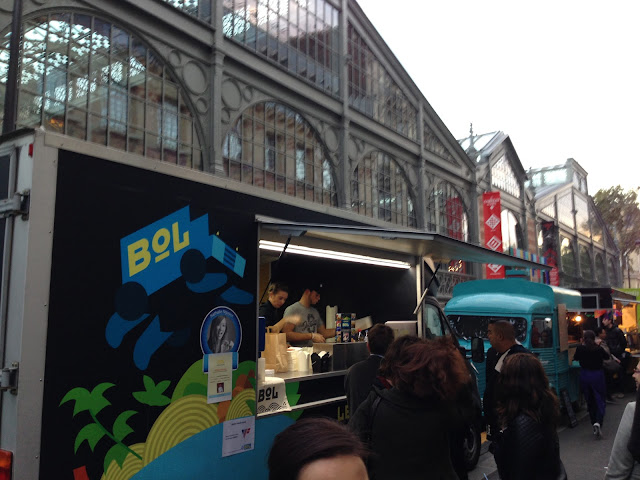
I subscribe to the notion of "Why not?", rather than limiting myself to possibilities that fit neatly into boxes. So when I saw a banner online advertising the opportunity to volunteer at the
Expo in Milan, I applied, not really thinking that it would work out. It did, and for two weeks at the beginning of August this one rolled her suitcase to Italy to eat pasta, meet new people and be in a place where she did not know the language.
The first hurdle was getting there: as we had to attend an introductory meeting on the Thursday and there were no suitable flights from Hamburg (18h layover in Bruxelles, anyone?), I took the train to Berlin, spent an evening there and left early the next morning. Since Ryanair lands at Malpensa Airport, it takes another hour by bus to reach the city. Berlin had been cool enough to wear a leather jacket over a blazer, but any layering proved detrimental as soon as I stumbled onto the sidewalk next to the central station - beads of sweat started pearling on my top lip and the feeling of sweating what could well fill a swimming pool didn't stop until I boarded a different plane heading back to Germany.
At the central station, I embarked on a linguistic adventure by trying to buy a two-week pass for the underground. None of the four tellers could speak anything except Italian (being multilingual this was very annoying, as normally I can get by with jumbling all Romance or Germanic languages), but after half an hour of drawing images and pointing at a calendar the friendly man and I seemed to have reached an agreement on what I wanted, and I walked out with a metro card. Sadly, it turned out to be only for the inner city, and the Expo is situated riiiiight outside of this. So near, and yet so far. The linguistic-ticket adventure continued the next day with the help of Italian volunteer Anna, who sacrificed some time to help me with the ticketing dilemma, but it all worked out (basically because I just nodded and Anna told me when to pay).
From there I rolled my suitcase to a bench near where our meet up would be. Ever so often a whiff of dog piss would waft over and pigeons were trying to camp out on my suitcase, but I feared moving since I'd probably get lost. When I did walk the last metres to the Fondazione Stelline where our group would be meeting up, I noticed that the bench I had been chilling on was right next to Santa Maria delle Grazie, the church where Da Vinci's
Last Supper is housed. Despite efforts during the following weeks to get an appointment to go in, everything had been booked solid weeks in advance and sadly I never managed to see it (but am finding solace is knowing I had kind of lain near a masterpiece).
After meeting everyone, getting various passes and official outfits, the group headed to a student residence just south of the Duomo, which would be our accommodation during our stay. The next two weeks had a similar daily rhythm: the first shift would meet up in the lobby, take the train to the Expo together, work the shift, have lunch together and then little groups would explore different pavilions or head into the city. For dinner we'd sometimes could something together or those on the upper floor would hang out on the terrace. Then the same thing would happen again the next day.
 |
| Empty Expo site. |
 |
| Ecuadorian National Day. |
 |
| Wicked headdress in even worse heat. |
Going to the Expo, I had no idea what I was in for. I pictured it like working at Disneyland, perhaps with a few more serious tasks as this was the
EU pavilion and not Space Mountain. Working there provided the chance to see the inner workings of such an enormous gathering (it runs from May to October, with 154 countries represented and 29 million visitors expected) and thus also question its relevance and validity. The construction of the Crystal Palace in 1851 in London or erecting the Eiffel Tower in 1889 in Paris was a feat of human endeavour, and represented the rapid advancements that came with industrialisation, colonialism and a general restructuring of the Western world as it had to accommodate both the masses of people flocking to the cities and the ideologies they were bringing with them. Naturally, the 19th century is also a time of questionable morality, as during the Expos people from the different colonies were
exhibited like animals for the amusement of the visitors. And yet I consider them to represent a sort of Internet of the times, where everything new and miraculous and exotic could be found under one roof. The Expos then made sense as they represented a brave new world to millions of people that otherwise would not have had the opportunity to expand their worldviews (albeit that this presentation was a feat of political manipulation to underline the power of various Western empires at the time).
 |
| Pavilion Zero, where the history of food is traced. |
 |
|
But after spending two weeks visiting various pavilions, the Expo seems redundant and more a space for showing off who has better financial means than an honest interaction with this year's theme of "Feeding the Planet, Energy for Life". The central idea was to interrogate how we could ensure food for the 9 billion people that will be weighing down the planet come 2050. Some pavilions did a great job at questioning this: Germany handed out cartons that turned into displays as one progressed through the exhibit and held them under various lights. I appreciated the information being presented in a way that was interesting both for children and for adults, and also the matter-of-fact approach (this is the problem, this is what we are doing/planning to do). As the only African country not being stuck somewhere in a cluster and pedalling wooden craftsmanship, Angola had different levels explaining the basics foods consumed in the country and the important role that women play in Angolan society. The UK combined art and beekeeping in the shape of a metal beehive whose sounds echoed those of a real one in some British city. Their emphasis was on the necessity of bees to human survival, as without them we would die out in four years.
 |
| German cartons making sense. |
 |
| Germany: practical advice to take home. |
 |
| Germany, still. |
 |
| The UK |
 |
| The UK Hive |
 |
| From the outside. |
 |
| Angolan Ladies. |
In contrast, Qatar had creepy holograms and showed how they had to import everything. Kazakhstan was very popular as it had a 5D film, which, I will not lie, was amazeballs. And yet, despite them stating at the entrance that they had the "resources to feed the world", the visitors were rushed quickly through the content area (all I could see was that they had run our of horse milk and had some strange fish in a pond) to the film, which then took you on a magical carpet ride through the country whilst also providing tidbits of information (9th largest country in the world, conservation area the size of Belgium). Austria illustrated how we cannot survive without air (true, but this was a food expo). The US had vertical gardens, where I wondered who ever went up and picked the berries and chillies hanging there.
 |
| Kazakhstan in 5D |
 |
| The Czech Republic's great pool. |
 |
| Austria. |
 |
| Still Austria. |
 |
| The USA. |
 |
| Pick me. |
Naturally, I have a limited interpretation as I didn't view nearly as many pavilions as some of the other volunteers or visitors and am also not familiar enough with the political and cultural histories of the various countries to make a fair and accurate judgement. Perhaps I am naive in my interpretation of what an Expo should be for, perhaps there are just too many players here gunning for the same ball, or perhaps it is evolution and the planet is simply not meant to feed 9 billion people. But whilst working at the EU pavilion, I was faced daily with the unhappy statistic of 1/3 of all food in Europe being wasted yearly as it flashed onto the screen in between people from all 28 countries saying "Hello, welcome, oi oi savaloy". Now knowing about this wastage, consider the
World Food Programme's hunger statistics of 1 in 9 people going hungry everyday, or of 1 in 4 in Africa being undernourished, or (inner feminist shuddering) that "if women farmers had the same access to resources as men, the number of hungry in the world could be reduced by up to 150 million". Is this not what we should be talking about? Is this not the point of "Feeding the Planet"? Is this not what the 28 million visitors are coming through the gates for?
Listen, I am not all doom and darkness. The weeks at the EU pavilion provided the opportunity to gain valuable insights into how the Union works, on how delicate political relationships need to be handled (case in point: India being absent from the Expo as there is some beef with Italy for Italian marines having mistaken Indian fishermen for pirates and thus shooting them dead. Now India wishes the marines to be tried in India, as they were in Indian waters, but Italy is refusing to hand them over. Something like that) and how human error seeps in everywhere, especially into events of this magnitude. I also learned what Snapchat was for (ok, I still don't get it, but I have downloaded it), how to say bad words in Italian and how to compromise when my personal desires contradict with what the group wants to do. This was a great group of enthusiastic young adults who want to make the world a better, more accepting, more integrated place and who were all very willing to both share their own culture and learn from others (yay EU).
But on the last night of our stay, we all gather on the roof of the pavilion to witness the marvel that is the Tree of Life, an interplay of light, water and music that makes the crowd cheer every time (and every half hour if I remember correctly). Everyone was tired but exited as we drank Aperol Spritz or beer and looked down on the masses that had gathered below to see this display. People were taking uncountable group photos and already reminiscing about how we'd stay in contact and never forget this.
 |
| Aperol for all. |
And that is when I realised that the simple answer is no. No, people do not want to pay to be informed of hard truths. They want to come to marvel at human innovation, they want to be astounded, they want to see that despite the world rushing forward at the heart of humanity there always beats the hope that we, with our ingenuity and mastery of machines, can handle whatever comes next. And despite me thinking that when shit hits the fan it'll all be a somewhat different story, for one moment there I could believe that all one needs to achieve happiness is an amazing choreography of lights and water bursts to the sounds of
Ombelico del Mondo.
 |
| Shine baby shine. |

















































